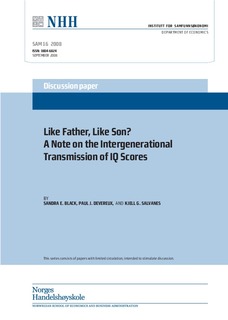| dc.contributor.author | Black, Sandra E. | |
| dc.contributor.author | Devereux, Paul J. | |
| dc.contributor.author | Salvanes, Kjell Gunnar | |
| dc.date.accessioned | 2008-12-18T09:04:53Z | |
| dc.date.available | 2008-12-18T09:04:53Z | |
| dc.date.issued | 2008-09 | |
| dc.identifier.issn | 0804-6824 | |
| dc.identifier.uri | http://hdl.handle.net/11250/163086 | |
| dc.description.abstract | More able parents tend to have more able children. While few would question the validity of this statement, there is little large-scale evidence on the intergenerational transmission
of IQ scores. Using a larger and more comprehensive dataset than previous work, we are able to estimate the intergenerational correlation in IQ scores, examining not just average correlations but also how this relationship varies for different subpopulations. We find that there is substantial intergenerational transmission of IQ scores; an increase in father’s
IQ at age 18 of 10% is associated with a 3.2% increase in son’s IQ at the same age. This relationship holds true no matter how we break the data. This effect is much larger than our estimated elasticity of intergenerational transmission of income of approximately .2. | en |
| dc.language.iso | eng | en |
| dc.publisher | Norwegian School of Economics and Business Administration. Department of Economics | en |
| dc.relation.ispartofseries | Discussion paper | en |
| dc.relation.ispartofseries | 2008:16 | en |
| dc.title | Like father, like son? : a note on the intergenerational transmission of IQ scores | en |
| dc.type | Working paper | en |
| dc.subject.nsi | VDP::Samfunnsvitenskap: 200::Økonomi: 210::Samfunnsøkonomi: 212 | en |
